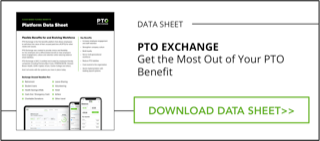Employers are offering more financial wellbeing programs to help alleviate financial stress, particularly for younger employees, and their organizations are seeing positive returns as a result.
Buck HR Survey Finds Increased Interest in Financial Wellbeing Programs Before COVID-19
 A recent survey by Buck, an integrated HR, benefits consulting, technology and administration firm, concluded that organizations are seeing positive returns on their investment in financial wellbeing programs.
A recent survey by Buck, an integrated HR, benefits consulting, technology and administration firm, concluded that organizations are seeing positive returns on their investment in financial wellbeing programs.
The findings indicate that "financial stress" is a top motivator for organizations investing in financial wellbeing programs and 40% of employers say "addressing financial stress" is a top reason for increasing voluntary benefit promotion. This compares with only 16% of companies who said the same thing in 2017, the last time Buck completed a similar survey.
 Further, an overwhelming 87% of employers believe investing in employee financial wellbeing will influence job satisfaction.
Further, an overwhelming 87% of employers believe investing in employee financial wellbeing will influence job satisfaction.
This survey was conducted between December, 2019 and February 2020, notably before the onset of the COVID-19 pandemic. See below for survey methodology.
Other key findings of the financial wellbeing survey include:
- 80% of employers expect to see direct savings resulting from voluntary benefits through enhanced recruitment, retention, behavioral change, and increased participation in cost-favorable plans.
- Helping employees meet short-term needs is a top priority. The focus has shifted to helping employees meet short-term financial obligations, such as budgeting and saving (68%), credit card debt (66%), and unexpected medical expenses (59%). Only 38% of respondents listed "retire when ready" as their top financial wellbeing priority. First things first.
- Employers are looking to expand benefit programs. The survey shows that even before the onset of COVID-19, almost two-thirds (63%) of employers were looking to add benefits that support emerging employee needs such as student loan debt or unexpected medical expenses. The top new benefits companies plan to add include:
- Student loan guidance and refinancing (20%);
- Student loan repayment (18%);
- Hospital indemnity (13%); and
- Long-term care (11%).
- For budget-squeezed Americans, benefits take on increased importance. An overwhelming majority (91%) of respondents indicated that voluntary benefits are an important part of a financial wellbeing strategy. Employers offer, on average, 10 programs that range from helping employees address unexpected expenses, debt, and paycheck-to-paycheck issues to legal services.
- Focus on millennials. According to the survey, 40% of employers say millennials, now the largest generation in the workforce, are top targets for financial support. Many are saddled with student loans, consumer debt, and a lack of savings – both for emergencies and for retirement.
 "Financial wellbeing is clearly a top priority for employers," said Brian Stitzel, U.S. Health Practice Leader for Buck.
"Financial wellbeing is clearly a top priority for employers," said Brian Stitzel, U.S. Health Practice Leader for Buck.
"Now, as we navigate the impact of COVID-19 on the U.S. economy, it's even more critical. Workers who've had wages reduced, been furloughed, or re-hired after a period of unemployment, may need extra support. And employers recognize that using voluntary benefits to help meet these employee needs can benefit their organization by lowering costs and increasing loyalty."
 “Even before the COVID-19 pandemic hit, companies were deeply aware of the financial stress many Americans struggle with every day,” said Tom Kelly, Principal and Voluntary Benefits Leader in Buck’s Health practice.
“Even before the COVID-19 pandemic hit, companies were deeply aware of the financial stress many Americans struggle with every day,” said Tom Kelly, Principal and Voluntary Benefits Leader in Buck’s Health practice.
“Hourly and millennial workers are seen to be most in need, and we’re seeing a renewed focus on voluntary benefits as a way to move employees from financial instability to stability and ultimately to enhanced financial peace of mind.”
Click here for the Buck press release and access to the full survey results.
Financial Wellbeing Survey Methodology
Responses were received from 164 organizations representing a broad range of industries with 500 or more full-time employees from December, 2019 through February, 2020. All questionnaire responses were carefully reviewed, statistical software was used to identify outliers and other unusual data points, and a final quality control review was conducted.
Use PTO to Enhance Financial Wellness
PTO Exchange has developed a flexible benefits platform that turns unused paid time off into liquid assets that can be converted into things employees value – retirement accounts, student loan payments, emergency cash-out, donations, leave-sharing, charitable causes and more.
This is a notable time with many companies making bold adjustments to their PTO strategy and trying to find new ways to help their employee community bridge the changes that are affecting their lives.
If enhancing financial wellness through PTO conversion is something that can help your organization navigate through this situation, we are here to help.
Learn more how PTO Exchange can help with financial wellness - download our free info sheet below.
Additional Resources:
Published on Jul 29, 2020 by Gregg Makuch
